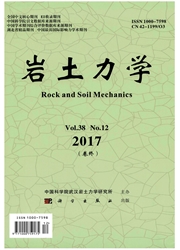

 中文摘要:
中文摘要:
已有研究表明,天然黏土的强度表现出明显的各向异性,但其规律未能经过严格的试验验证。基于空心圆柱仪(HCA)的杭州原状软黏土试验结果,对Casagrande法进行修正,提出大主应力方向为任意方向剪切时土体的强度公式。假定基坑开挖引起的土体滑动破坏模式为Prandtl模式,利用上述强度公式,得到基坑抗隆起稳定的塑性上限解。结合算例,讨论了土体强度各向异性比、挡墙入土深度比、墙底下卧硬土层深度、挡墙粗糙度等因素对基坑坑底抗隆起稳定的影响。采用该方法分析杭州某失稳基坑实例,通过与已有方法的结果对比,验证了所提方法的合理性。研究表明,不考虑土体强度各向异性和基于Casagrande各向异性公式的抗隆起分析都将高估杭州软黏土基坑的抗隆起稳定性。
 英文摘要:
英文摘要:
According to the present researches, the strength of natural clay shows significant anisotropic properties, but its objective laws haven't been verified by rigorous tests. Based on the Hangzhou intact soft clay tests that are finished by hollow cylinder apparatus (HCA), a formula of the anisotropic clay strength for any principal stress directions is proposed to modify the Casagrande formula in this paper. Assuming that the soil slip failure mode follows the Prandtl mechanism, the upper bound solution of stability against basal heave of excavation is presented. Furthermore, the influences on stability against basal heave of excavation caused by the factors such as the anisotropy ratio of soil, the embedded depth of the retaining wall, the thickness of soft clay layer between the foundation base and the underlying hard stratum as well as the wall roughness are discussed. The method proposed in this paper is verified by a case study in Hangzhou basal soil after failure. It is also shown that it would overestimate the safety against basal heave if the anisotropy of strength is ignored or the Casagrande anisotropic strength formula is adopted.
 同期刊论文项目
同期刊论文项目
 同项目期刊论文
同项目期刊论文
 期刊信息
期刊信息
